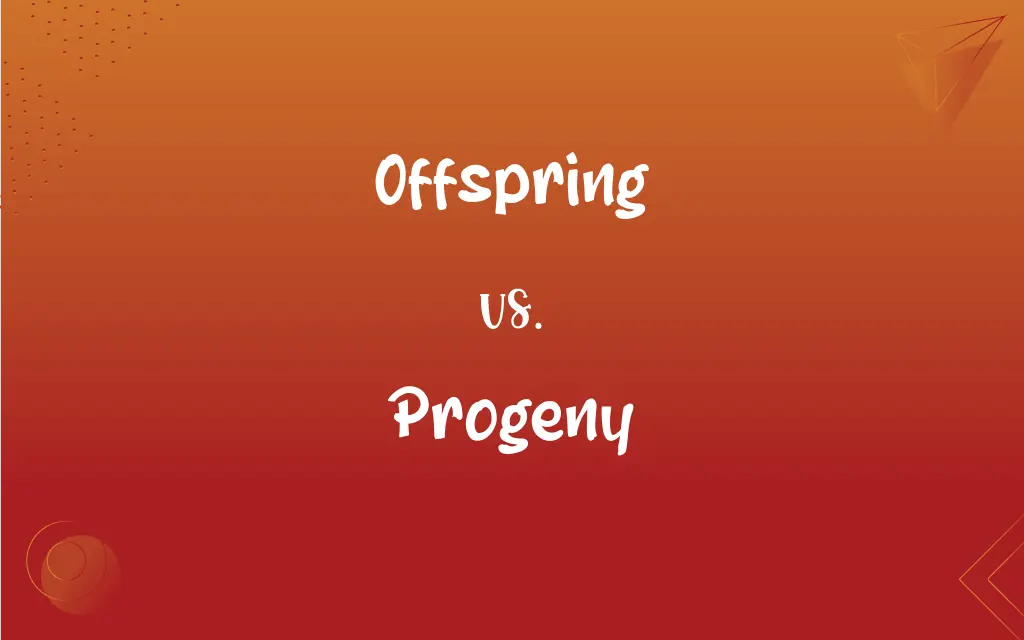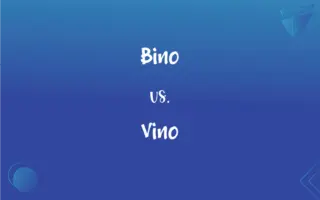Offspring vs. Progeny: What's the Difference?
Edited by Harlon Moss || By Janet White || Updated on September 28, 2023
Offspring and progeny both refer to the children or descendants of a person, animal, or plant. Offspring is more commonly used in everyday language, while progeny is often more formal and can also emphasize lineage or heritage.

Key Differences
Both "offspring" and "progeny" denote the descendants of an individual, whether human, animal, or plant. However, "offspring" is a word that is more frequently used in everyday conversations and casual contexts. It is simple and straightforward, typically referring to the immediate children of an individual. "Progeny," on the other hand, carries a more formal tone and is often used in scientific, literary, or legal contexts.
"Offspring" can refer to one child or multiple children, and the plural form of the word remains "offspring." This term is quite versatile, used to describe both human and non-human descendants, without any additional connotations. "Progeny" can also refer to one or many descendants but leans more toward the idea of a line of descendants stretching over generations.
In terms of etymology, "offspring" comes from Old English, combining "off" and "springan," meaning to spring off or arise. This roots the term in a more straightforward, natural process. "Progeny" derives from the Latin "progenies," meaning descent, origin, or race. This origin provides the term with its formal and somewhat lofty tone, often implying a lineage with particular traits or importance.
The term "offspring" is often used in a biological or genetic context to describe the immediate descendants resulting from reproduction. "Progeny," while also used in biological and genetic contexts, may emphasize heritage, lineage, or the continuation of specific traits through generations. While both terms can be used interchangeably in many cases, the choice between them can set the tone and focus of the discussion.
Comparison Chart
Common Usage
Everyday language
Formal, scientific
ADVERTISEMENT
Number
Singular/Plural same
Singular/Plural same
Connotation
Neutral
Lineage, heritage
Etymology
Old English
Latin
Contexts
Biological, casual
Biological, formal
Offspring and Progeny Definitions
Offspring
An entity that has been derived or comes from a parent entity.
This new software is the offspring of previous versions.
ADVERTISEMENT
Progeny
Offspring with an emphasis on lineage or heritage.
The scientist's progeny continued the family tradition of research.
Offspring
The result of a reproductive process.
The kitten is the offspring of the older cat.
Progeny
The outcome of a creative or intellectual process.
His paintings are the progeny of years of study and practice.
Offspring
Descendants in the immediate line.
The prince is the offspring of the king.
Progeny
Descendants of a person, often across multiple generations.
The royal progeny are expected to inherit the throne.
Offspring
Products or outcomes that come from a specific source.
The book is the intellectual offspring of the author's research.
Progeny
The young or offspring of a living organism.
The wolf's progeny stayed close to their mother.
Offspring
The organism or organisms resulting from sexual or asexual reproduction.
Progeny
The organism or organisms resulting from sexual or asexual reproduction.
Offspring
A child or children of a parent or parents
The offspring of Zeus and Leto.
Progeny
A child or children of a parent or parents
Claimed to be the progeny of the king.
Offspring
The result or product of something
"the glaciers, the offspring of the gentle snow" (John Muir).
Progeny
A person's descendants considered as a group.
Offspring
A person's daughter(s) and/or son(s); a person's children.
Progeny
A result or product
Lies that were the progeny of fear.
Offspring
All of a person's descendants, including further generations.
Progeny
(uncountable) Offspring or descendants considered as a group.
I treasure this five-generation photograph of my great-great grandmother and her progeny.
Offspring
An animal or plant's progeny or young.
Progeny
Descent, lineage, ancestry.
Offspring
(figuratively) Anything produced; the result of an entity's efforts.
Artists often treasure their works as their immortal offspring.
Progeny
A result of a creative effort.
His dissertation is his most important intellectual progeny to date.
Offspring
(computing) A process launched by another process.
Progeny
Descendants of the human kind, or offspring of other animals; children; offspring; race, lineage.
Offspring
The act of production; generation.
Progeny
The immediate descendants of a person;
She was the mother of many offspring
He died without issue
Offspring
That which is produced; a child or children; a descendant or descendants, however remote from the stock.
To the gods aloneOur future offspring and our wives are known.
Progeny
Individuals or items derived from a common source.
These innovations are the progeny of technological advancements.
Offspring
Origin; lineage; family.
Offspring
The immediate descendants of a person;
She was the mother of many offspring
He died without issue
Offspring
Something that comes into existence as a result;
Industrialism prepared the way for acceptance of the French Revolution's various socialistic offspring
This skyscraper is the solid materialization of his efforts
Offspring
Any immature animal
Offspring
The child or children of a person or animal.
Sarah is the offspring of Jane and Mark.
FAQs
What do Offspring and Progeny mean?
Both refer to descendants but "offspring" is more casual and "progeny" is more formal.
Is Offspring singular or plural?
It can be both singular and plural.
Is Progeny more formal than Offspring?
Yes, "progeny" is often used in formal contexts.
Is Progeny singular or plural?
It can be both singular and plural.
What's the etymology of Offspring?
It originates from Old English.
Can Offspring and Progeny refer to animals?
Yes, both can refer to animal descendants.
Is Progeny used in scientific literature?
Yes, particularly in genetics and breeding research.
Can Offspring and Progeny be used interchangeably?
Generally, yes, but the choice can affect the tone.
Is Offspring used in common speech?
Yes, it's widely used in everyday language.
Can Offspring and Progeny refer to plants?
Yes, both can refer to plant descendants.
Do Offspring and Progeny have any legal definitions?
"Progeny" may appear in legal contexts more often, but both can be used.
What's the etymology of Progeny?
It originates from Latin.
What's the main difference between Offspring and Progeny?
"Offspring" is more neutral and "progeny" often emphasizes lineage or heritage.
Can Offspring and Progeny refer to ideas or creations?
Yes, both can refer to intellectual or creative "descendants."
Do Offspring and Progeny have gender-specific forms?
No, both are gender-neutral.
About Author
Written by
Janet WhiteJanet White has been an esteemed writer and blogger for Difference Wiki. Holding a Master's degree in Science and Medical Journalism from the prestigious Boston University, she has consistently demonstrated her expertise and passion for her field. When she's not immersed in her work, Janet relishes her time exercising, delving into a good book, and cherishing moments with friends and family.
Edited by
Harlon MossHarlon is a seasoned quality moderator and accomplished content writer for Difference Wiki. An alumnus of the prestigious University of California, he earned his degree in Computer Science. Leveraging his academic background, Harlon brings a meticulous and informed perspective to his work, ensuring content accuracy and excellence.































































